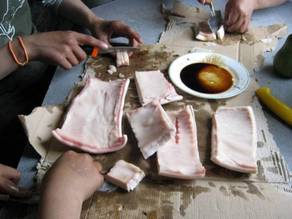Arviat, Nunavut

Year(s) Funded: 2010-2011
Topic Area: Food Security Contact: Shirley Tagalik ([email protected]) James Ford ([email protected]) Maude Beaumier ([email protected]) Partners:Arviat Health Committee, McGill University Website: http://www.arviat.ca Title: Determinants of Food Security among Inuit Women in Arviat, Nunavut: The Role of Climate Change and Multiple Socio-Economic Stresses
Action: The aim of this project was to identify and characterize the vulnerability and adaptability of the Inuit women’s food system to climate change in the context of multiple stresses. Photovoice, semi-structured interviews with Inuit women and key informants, focus groups with women, Elders and hunters were used to collect in-depth qualitative data. Results: Key findings show that the food system of women is affected by environmental (climatic and biophysical) variability. Arviarmiut did not associate change in caribou migration pathway and increases in polar and grizzly bear populations with climate change, but rather with natural cycles. Currently, multiple human and historical factors play a predominant role in determining the food security status of women: Financial resources and budgeting skills; Store food knowledge; Decreases in the transmission of country food knowledge; Decreases in traditional training; Substance use and gambling; High cost of living; and Presence of a spouse, as single women are particularly at risk of being food insecure as they are economically disadvantaged. While climate change was not identified as an important stressor on the food system by interviewees, when participant observations are placed in conversation with scientific literature on climate change there are clear linkages between climate change and food security for women in the Canadian Arctic. Outputs:
Additional Publications & Resources
|
